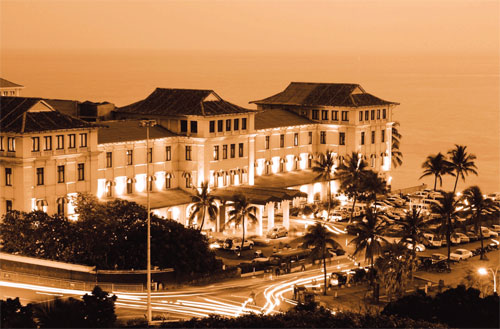Galle Face
The Galle Face Green stretches from the foyer of the Galle Face
Hotel, to the old Parliament building now used as the Presidential
Secretariat, hugging the western coast of Colombo along the waters of
the Indian Ocean.

The green grassy promenade has been a place for families to gather
and spend their leisure, flying kites, eating gram, playing cricket and
soccer, or even simply jogging along to keep fit and slim. Evenings on
the promenade are always choked to capacity with people and vendors,
especially on weekends.
The cool breeze wafting from the Indian Ocean and the open spaces
that bring in so much light and laughter bring a sense of calm and
relief to the weary body and mind. Children frolic as if they were
spending time in Disneyland.The early morning hours see many elderly and
elegant folks driving up to exercise their bodies, walking along the
beachfront stretch from end to end. In the old days colonial masters and
their local counterparts used to ride on horseback here as a form of
exercise.
In recent times the weekends take on a carnival atmosphere with an
abundance of food and delights being offered for sale. People swarm to
sit on the grass and loosen up over the humdrum of the week that was.
The Green was also used for a wide variety of social, religious,
cultural and entertaining occasions such as the Old Crocks Rally,
musical fiestas, religious festivals and cross country races.
The Galle Face Hotel is one of the most significant and beautiful
landmarks in Colombo. It boasts of a history well over 100 years today.
Its grand Renaissance-style structure has welcomed and served visitors
to the island for many decades.
A plaque at the entrance proudly announces that the hotel was in
existence long before 1866 when the first railway engines were
introduced to the island.
The delightful Victorian style halls, dining and bedrooms display a
splendour of that era which is relished by many tourists who choose to
visit Sri Lanka and enjoy the luxury of those halcyon times. The Galle
Face Hotel was one of the first buildings at the turn of the century to
have electricity which lit up its elegance. It provided an elevator
service for those who couldn't walk up the stairs.
Behind the Taj Samudra Hotel and across the road opposite the Army
Headquarters at Slave Island is the Victoria Masonic Hall. Built during
the British Colonial times it houses the Ceylon Association of
Freemasons.The building was opened on September 5, 1901. It was
envisioned in 1897 to commemorate Queen Victoria's diamond jubilee. The
history of Freemasons in Sri Lanka dates back to the Dutch era.
The Galle Face Burial Grounds
In the early years in Ceylon, the British used the Dutch cemetery in
Pettah to bury their dead. Later they moved the final place of rest to
the southern bank of the Beira Lake which is now the frontal yard of the
Secretariat building. It was named the Galle Face Burial Grounds. People
at that time referred to it jokingly as 'Padre Bailey's Go-Down', so
referred to after the Anglican Archdeacon Bailey who officiated at many
of the funeral ceremonies held there.
The cemetery was exclusively for British nationals. In 1860, a plot
of bare land at Kanatte in Borella, Colombo was declared the common
burial grounds for people of Sri Lanka belonging to different
communities.
The Galle Face Burial Grounds was then taken over by the British
Military and used till the end of World War 1.
- Internet |

